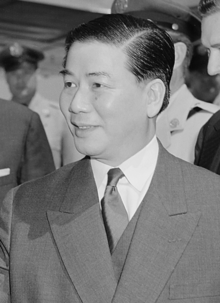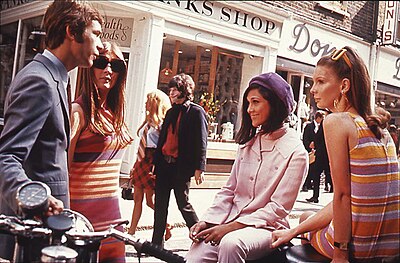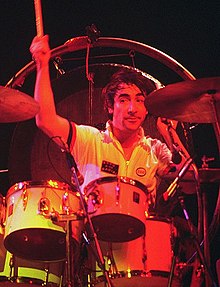The 1960s Portal
The 1960s became synonymous with the new, radical, and subversive events and trends of the period. In Africa the 1960s was a period of radical political change as 32 countries gained independence from their European colonial rulers. Some commentators have seen in this era a classical Jungian nightmare cycle, where a rigid culture, unable to contain the demands for greater individual freedom, broke free of the social constraints of the previous age through extreme deviation from the norm. Christopher Booker charts the rise, success, fall/nightmare and explosion in the London scene of the 1960s. However, this alone does not explain the mass nature of the phenomenon. Several nations such as the U.S., France, Germany and Britain turned to the left in the early and mid 1960s. In the United States, John F. Kennedy, a Keynesian and staunch anti-communist, pushed for social reforms. His assassination in 1963 was a stunning shock. Liberal reforms were finally passed under Lyndon B. Johnson including civil rights for African Americans and healthcare for the elderly and the poor. Despite his large-scale Great Society programs, Johnson was increasingly reviled by the New Left at home and abroad. The heavy-handed American role in the Vietnam War outraged student protestors across the globe, as they found peasant rebellion typified by Ho Chi Minh and Che Guevara more appealing. Italy formed its first left-of-center government in March 1962 with a coalition of Christian Democrats, Social Democrats, and moderate Republicans. Socialists joined the ruling block in December 1963. In Britain, the Labour Party gained power in 1964. In Brazil, João Goulart became president after Jânio Quadros resigned. This is a Featured article, which represents some of the best content on English Wikipedia..
On November 11, 1960, a failed coup attempt against President Ngô Đình Diệm of South Vietnam was led by Lieutenant Colonel Vương Văn Đông and Colonel Nguyễn Chánh Thi of the Airborne Division of the Army of the Republic of Vietnam (ARVN). The rebels launched the coup in response to Diệm's autocratic rule and the negative political influence of his brother Ngô Đình Nhu and sister-in-law Madame Nhu. They also bemoaned the politicisation of the military, whereby regime loyalists who were members of the Ngô family's covert Cần Lao Party were readily promoted ahead of more competent officers who were not insiders. Đông was supported in the conspiracy by his brother-in-law Lieutenant Colonel Nguyen Trieu Hong, whose uncle was a prominent official in a minor opposition party. The main link in the coup was Đông's commanding officer Thi, whom he persuaded to join the plot. (Full article...)This is a Good article, an article that meets a core set of high editorial standards.
The February 1969 nor'easter was a severe winter storm that affected the Mid-Atlantic and New England regions of the United States between February 8 and February 10. The nor'easter dropped paralyzing snowfall, exceeding 20 in (51 cm) in many places. New York City bore the brunt of the storm, suffering extensive disruption. Thousands of travelers became stranded on roads and in airports. The storm killed at least 94 people. City schools were closed for several days and some areas of the city remained uncleared for over a week. New York Mayor John Lindsay was criticized for failing to respond to the snowstorm adequately. (Full article...) Selected picture -Did you know -
Related portalsThis is a Featured article, which represents some of the best content on English Wikipedia..
Sir Richard Starkey MBE (born 7 July 1940), known professionally as Ringo Starr, is an English musician, songwriter and actor who achieved international fame as the drummer for the Beatles. Starr occasionally sang lead vocals with the group, usually for one song on each album, including "Yellow Submarine" and "With a Little Help from My Friends". He also wrote and sang the Beatles songs "Don't Pass Me By" and "Octopus's Garden", and is credited as a co-writer of four others. Starr was afflicted by life-threatening illnesses during childhood, with periods of prolonged hospitalisation. He briefly held a position with British Rail before securing an apprenticeship as a machinist at a Liverpool school equipment manufacturer. Soon afterwards, Starr became interested in the UK skiffle craze and developed a fervent admiration for the genre. In 1957, he co-founded his first band, the Eddie Clayton Skiffle Group, which earned several prestigious local bookings before the fad succumbed to American rock and roll around early 1958. When the Beatles formed in 1960, Starr was a member of another Liverpool group, Rory Storm and the Hurricanes. After achieving moderate success in the UK and Hamburg, he quit the Hurricanes when he was asked to join the Beatles in August 1962, replacing Pete Best. (Full article...)This is a Good article, an article that meets a core set of high editorial standards.
Keith John Moon (23 August 1946 – 7 September 1978) was an English musician who was the drummer for the rock band the Who. Regarded as one of the greatest drummers in the history of rock music, he was noted for his unique style of playing and his eccentric, often self-destructive behaviour. Moon grew up in Wembley and took up the drums during the early 1960s. After playing with a local band, the Beachcombers, he joined the Who in 1964 before they recorded their first single. Moon was recognised for his drumming style, which emphasised tom-toms, cymbal crashes, and drum fills. Throughout his tenure with the Who, his drum kit steadily grew in size, and (along with Ginger Baker) he has been credited as one of the earliest rock drummers to regularly employ double bass drums in his setup. Moon occasionally collaborated with other musicians and later appeared in films, but considered playing in the Who his primary occupation, and remained a member of the band until his death. In addition to his talent as a drummer, Moon developed a reputation for smashing his kit on stage and destroying hotel rooms on tour. He was fascinated with blowing up toilets with cherry bombs or dynamite, and destroying television sets. Moon also enjoyed touring and socialising, and became bored and restless when the Who were inactive. His 21st birthday party in Flint, Michigan, has been cited as a notorious example of decadent behaviour by rock groups. (Full article...)Selected article -Eric Patrick Clapton CBE (born 30 March 1945) is an English rock and blues guitarist, singer, and songwriter. He is regarded as one of the most successful and influential guitarists in rock music. He ranked second in Rolling Stone's list of the "100 Greatest Guitarists of All Time" and fourth in Gibson's "Top 50 Guitarists of All Time". In 2023, Clapton was named the 35th best guitarist of all time. He was also named number five in Time magazine's list of "The 10 Best Electric Guitar Players" in 2009. After playing in a number of different local bands, Clapton joined the Yardbirds from 1963 to 1965, and John Mayall & the Bluesbreakers from 1965 to 1966. After leaving Mayall, he formed the power trio Cream with drummer Ginger Baker and bassist/vocalist Jack Bruce, in which Clapton played sustained blues improvisations and "arty, blues-based psychedelic pop". After four successful albums, Cream broke up in November 1968. Clapton then formed the blues rock band Blind Faith with Baker, Steve Winwood, and Ric Grech, recording one album and performing on one tour before they broke up. Clapton then toured with Delaney & Bonnie and recorded his first solo album in 1970, before forming Derek and the Dominos with Bobby Whitlock, Carl Radle and Jim Gordon. Like Blind Faith, the band only lasted one album, Layla and Other Assorted Love Songs, which includes "Layla", one of Clapton's signature songs. (Full article...)More Did you know (auto generated)
TopicsCategoriesWikiProjects
Associated WikimediaThe following Wikimedia Foundation sister projects provide more on this subject:
Discover Wikipedia using portals |































